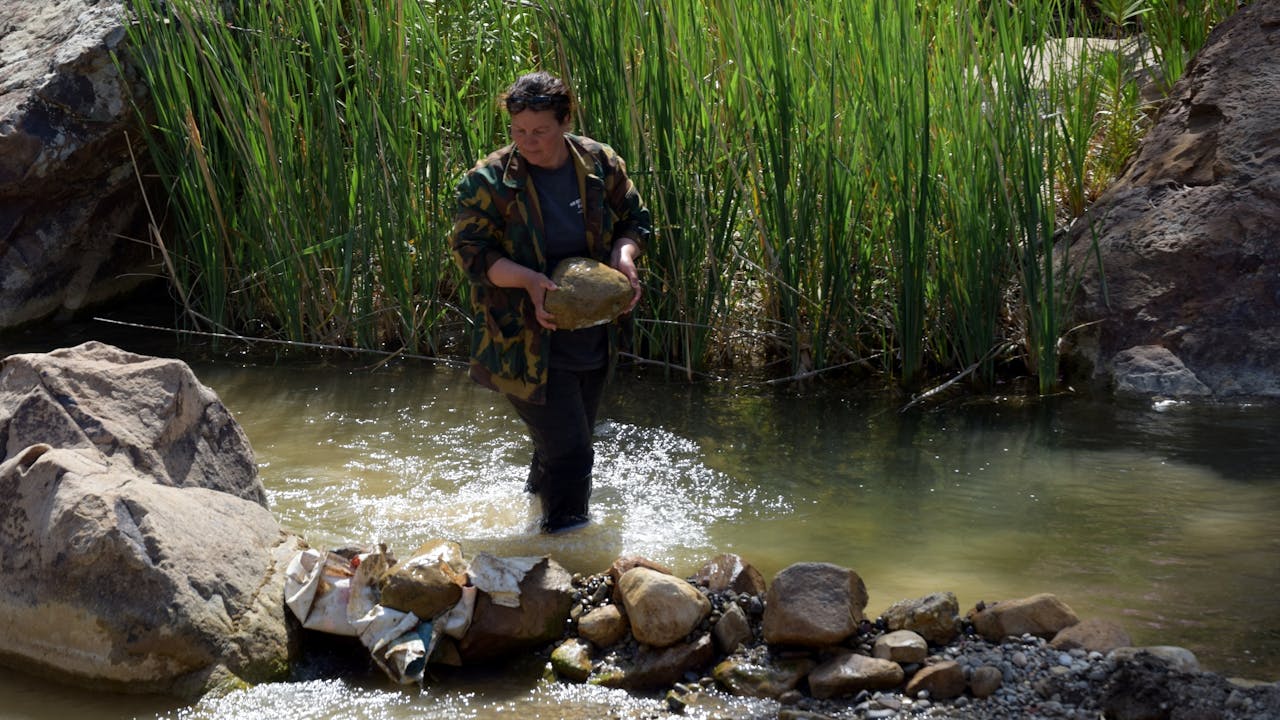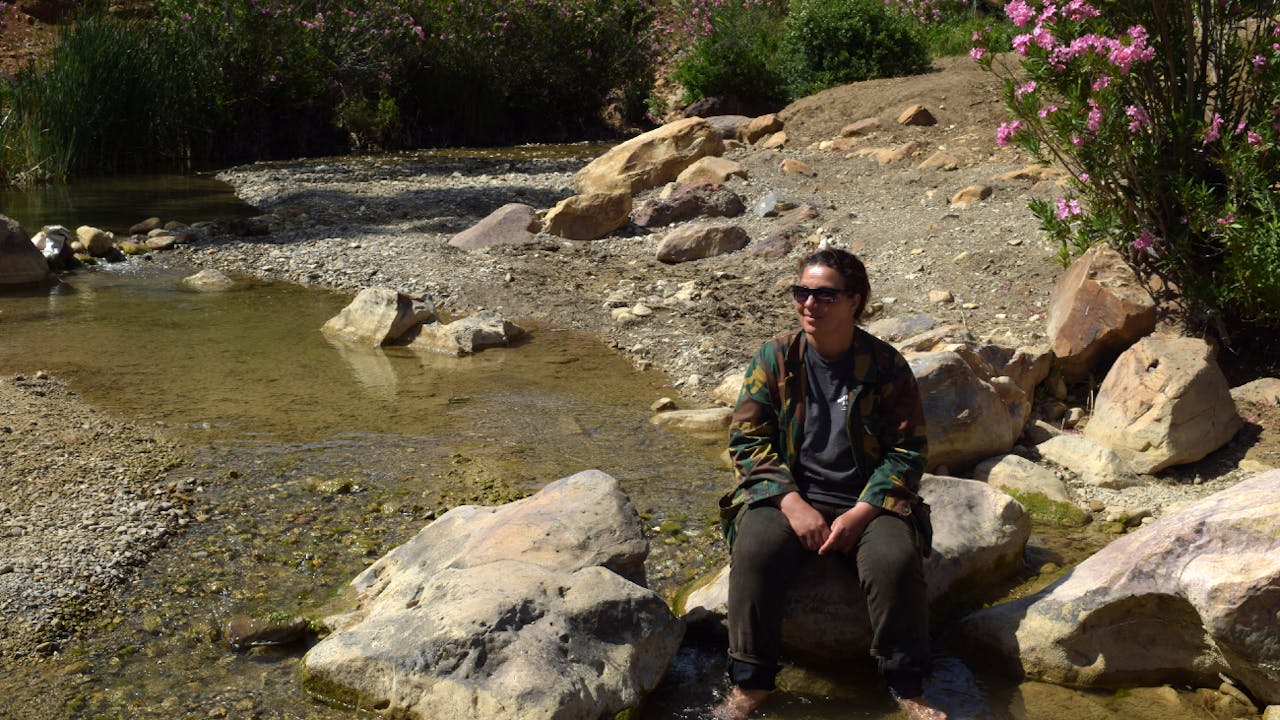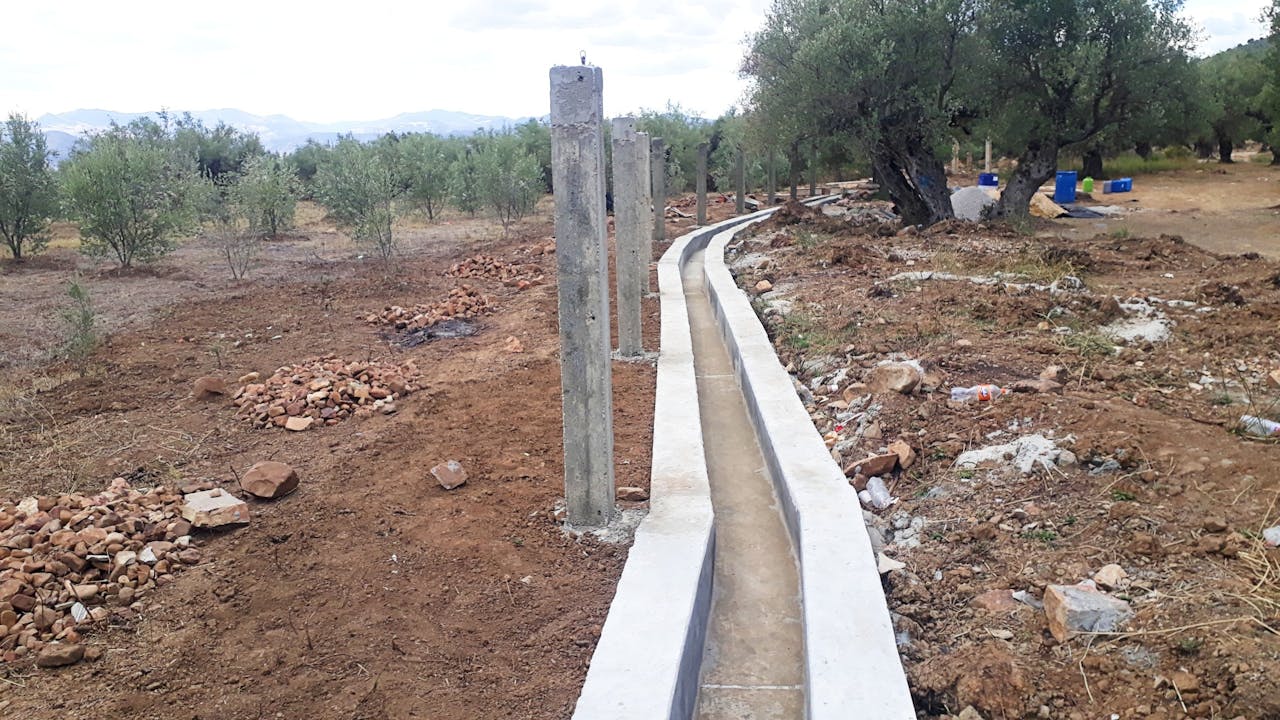My name is Saida Zouaoui, I’m 40 years old, I’m from a farming family and farming is my passion. It’s my Berber grandfather, who I respect and who I thank with all my heart, who passed down the tradition of building dams using an ancient technique.
When I was born, my father was already working as a farmer. My older brother helped him a lot and I studied. After my brother died, I stayed with my father. He was deeply shaken by my brother’s death. It was as though his whole life had fallen apart. He stopped everything and didn’t want to work anymore. At first, I didn’t want to leave him alone. Over time, little by little, I started to enjoy farming. I became enthusiastic about it. I invest a lot in my work, it makes me happy. It’s when I’m working that I’m truly happy.
We ran into difficulties. The land had changed over time. Things were easier when there was a dam, even the traditional one. Then we had problems of erosion – the water started to run off differently. We lost lots of water. The earth became cracked and it became harder and harder to bring back the water, because in the winter it’s absorbed by the earth and in summer the earth cracks. As a result, many farmers – over 40 – gradually moved away. They said, “Our fathers earned nothing, and as for us …”
But our grandparents never left their land, no matter what happened. It was a matter of principle for them, even if they earned nothing.
These problems pushed young people to leave for Tunis to work on construction sites. Some of them studied, others left and abandoned their land. The region became almost deserted.
It became more and more difficult to bring back the water, so many farmers gradually moved away and the young people left for Tunis.

I, on the other hand, inherited the principle of not leaving the land. My father died just three months after my marriage, in a car accident. I came back to the village with my husband’s agreement, because the land was abandoned. There was just my little brother, one of those desperate young people who didn’t want to bother to work. The farm was deserted, with its tractor and even a hunting rifle that the police had seized after my father’s death. I came back. I had to return things to the way they were before, like my father did. I thank God I recovered the rifle and started working again. With five or six farmers who were still here, we’d go out and work on the dam, still the old-fashioned way. We watered the land. Of course we were losing money, since we didn’t have enough water in the summer. Things were better in the spring but we never lost hope.

It was my Berber grandfather who passed down the tradition of building dams using an ancient technique.
© Ezer MnasriI’ll tell you something. Before, I always had something weighing on me. I believed that one day the situation would change, that a miracle would occur or something like that and things would be alright. I believed that. Every time we had a municipal meeting or something like that, whenever I was asked to speak on the radio (there used to be Radio Kef), I would always talk about the dam. I pinned all my hopes on the dam.
Since I’m in the region, I can tell you that I’m popular, almost everyone knows me. I’m the only woman driving a tractor, working the land, the sites, everyone knows it. Everyone’s known for a long time that there was only one thing I wanted to do: make the dam operational and irrigate the entire region, for the farmers to come back and life to resume. Everyone knew that was my dream.

I’ve always been hopeful that we could farm again in my village.
© Ezer MnasriA special delegation met with Mr Belgacem Klai, who called me to say, “Saida, there’s a chance, don’t get too hopeful, but we’ll try.” We didn’t know why, but the International Labour Organization had come, to talk about erosion and other things. They told me that if I wanted to pass on a message, I could. The meeting took place, the people got together, some spoke about public lighting and other subjects … I talked about the question of water and it worked, thanks be to God, my dream came true.
Why did I want the dam to be fixed and restored above all else? So that we’d have water, so that people would be motivated, so that the young people would no longer leave the land, so that they would stick to the land like the older generation did.
There was only one thing I wanted to do: make the dam operational and irrigate the entire region, for the farmers to come back and life to resume.

They say that every cloud has a silver lining. It’s true that COVID weakened the country and harmed many things, but it also contributed to something truly tangible. The people who left, especially those working in the hotel business, came back and were confined to their homes. The cafés were closed … what were they to do? Sometimes, when you’re bored, you take a pot and you plant something. They started to plant vegetables. From that moment, young people started to take the initiative. They all wanted to recover and work their land. They had understood something. And in fact, it was agriculture that held up the State during the crisis.
The State is represented by institutional bodies, such as the Ministry of Agriculture and the forest service - it’s present, it stands by us and supports us. It’s understanding, but it lacks resources.

Now that the dam has been repaired and rebuilt, water is once again available for farming.
© Ezer MnasriI’ve always had great confidence in the organizations, especially the International Labour Organization. At first, I thought it was politics, that they would sell us a dream and go away and leave us. But I’ve read a lot about the ILO’s work, I’ve seen what they’ve done in Algeria. I’ve seen the results. Before, the farmers were hesitant. I was the first farmer to follow the ILO, since it had been preceded by its reputation, in Rwanda as well. Thank God I wasn’t disappointed. The people whose hearts were heavy, now they’ve seen the results, they’ve become more optimistic and motivated. Now, everyone wants to work.
The thing that makes me really happy is that the region’s young people who are still studying want to specialize in agronomics. I’m self-taught. But they want to master the techniques and work with a good method.
